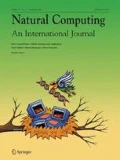Abstract
Turing’s notion of human computability is exactly right not only for obtaining a negative solution of Hilbert’s Entscheidungsproblem that is conclusive, but also for achieving a precise characterization of formal systems that is needed for the general formulation of the incompleteness theorems. The broad intellectual context reaches back to Leibniz and requires a focus on mechanical procedures; these procedures are to be carried out by human computers without invoking higher cognitive capacities. The question whether there are strictly broader notions of effectiveness has of course been asked for both cognitive and physical processes. I address this question not in any general way, but rather by focusing on aspects of mathematical reasoning that transcend mechanical procedures.
Section 1 discusses Gödel’s perspective on mechanical computability as articulated in his [193?], where he drew a dramatic conclusion from the undecidability of certain Diophantine propositions, namely, that mathematicians cannot be replaced by machines. That theme is taken up in the Gibbs Lecture of 1951; Gödel argues there in greater detail that the human mind infinitely surpasses the powers of any finite machine. An analysis of the argument is presented in Section 2 under the heading Beyond calculation. Section 3 is entitled Beyond discipline and gives Turing’s view of intelligent machinery; it is devoted to the seemingly sharp conflict between Gödel’s and Turing’s views on mind. Their deeper disagreement really concerns the nature of machines, and I’ll end with some brief remarks on (supra-) mechanical devices in Section 4.
Similar content being viewed by others
References
Church A (1937a). Review of [Turing 1936]. Journal of Symbolic Logic 2(1):40–41
Church A (1937b) Review of [Post 1936]. Journal of Symbolic Logic 2(1):42–43
Davis M (2004) The myth of hypercomputation. In: Teuscher C (ed) Alan Turing: Life and Legacy of a Great Thinker, pp. 195–211. Springer
Dawson J (1997). Logical Dilemmas. A.K. Peters, Wellesley, Massachusetts
Feferman S (1988) Turing in the land of O(z). In: Herken (ed) 1988, pp. 113–147
Gandy R (1980). Church’s Thesis and principles for mechanisms. In: Barwise J, Keisler HJ, Kunen K (eds), The Kleene Symposium. North-Holland Publishing Company, Amsterdam, pp. 123–148
Gödel, K (1933) The present situation in the foundations of mathematics. Collected Works III, 45–53
Gödel K (1934) On undecidable propositions of formal mathematical systems. Collected Works I: 346–371
Gödel, K (193?) Undecidable Diophantine propositions. Collected Works III: 164–175
Gödel, K (1946) Remarks before the Princeton bicentennial conference on problems in mathematics. Collected Works II: 150–153
Gödel, K (1951) Some basic theorems on the foundations of mathematics and their implications. Collected Works III: 304–323
Gödel, K (1964) Postscriptum for [1934]. Collected Works I: 369–371
Gödel, K (1972a) Some remarks on the undecidability results. Collected Works II: 305–306
Gödel, K (1972b) The best and most general version of the unprovability of consistency in the same system; First of the notes [1972a]
Gödel, K (1972c) Another version of the first undecidability result; Second of the notes [1972a]
Gödel, K (1972d) A philosophical error in Turing’s work; Third of the notes [1972a]
Gödel, K (1974) Note in [Wang 1974], 325–326
Gödel, K (1986) Collected Works I, Oxford University Press
Gödel, K (1990) Collected Works II, Oxford University Press
Gödel, K (1995) Collected Works III, Oxford University Press
Gödel, K (2003) Collected Works IV–V, Oxford University Press
MacLane, S (1934) Abgekürzte Beweise im Logikkalkul. Ianaugural-Dissertation, Göttingen.
MacLane, S (1935a) Logical analysis of mathematical structure; The Monist 45: 118–130.
MacLane, S (1979a) late return to a thesis in logic. In: Kaplansky I (ed) Saunders MacLane – Selected Papers, pp. 63-66. Springer-Verlag
Mundici D, Sieg W (1995). Paper machines. Philosophia Mathematica 3:5–30
Post E (1936). Finite combinatory processes. Formulation I. Journal of Symbolic Logic 1:103–5
Sieg, W (1994) Mechanical procedures and mathematical experience. In: George A (ed) Mathematics and Mind, pp. 71–117. Oxford University Press
Sieg, W (2002a). Calculations by man and machine: conceptual analysis. Lecture Notes in Logic 15:390–409
Sieg W (2002b). Beyond Hilbert’s reach?. In: Malalment DB (eds), Reading Natural Philosophy. Open Court, Chicago, pp. 363-405
Sieg, W (2006) Gödel on computability. Philosophia Mathematica 14: 189–207
Sieg W, Field C (2005). Automated search for Gödel’s proofs. Annals of Pure and Applied Logic 133:319–338
Siegelmann, HT (1997) Neural Networks and Analog Computation – Beyond the Turing Limit. Birkhäuser
Turing, A (1936) On computable numbers, with an application to the Entscheidungsproblem. Proceedings of the London Mathematical Society, Series 2 (42), 230–265; reprinted in Davis 1965
Turing, A (1939) Systems of logic based on ordinals. Proceedings of the London Mathematical Society, Series 2 45, 161–228; reprinted in Davis 1965
Turing, A (1947) Lecture to the London Mathematical Society on 20 February 1947. In: Ince DC (ed) Collected Works of A.M. Turing – Mechanical Intelligence, pp. 87–105. North Holland, 1992
Turing, A (1948) Intelligent machinery. In: Ince DC (ed) Collected Works of A.M. Turing – Mechanical Intelligence, pp. 107–127. North Holland, 1992
Turing A (1950). Computing machinery and intelligence. Mind 59:433–460
Turing A (1954). Solvable and unsolvable problems; Science News 31:7–23
Wang H (1974). From Mathematics to Philosophy. Routledge & Kegan Paul, London
Author information
Authors and Affiliations
Corresponding author
Rights and permissions
About this article
Cite this article
Sieg, W. On mind & Turing’s machines. Nat Comput 6, 187–205 (2007). https://doi.org/10.1007/s11047-006-9021-9
Received:
Revised:
Accepted:
Published:
Issue Date:
DOI: https://doi.org/10.1007/s11047-006-9021-9




